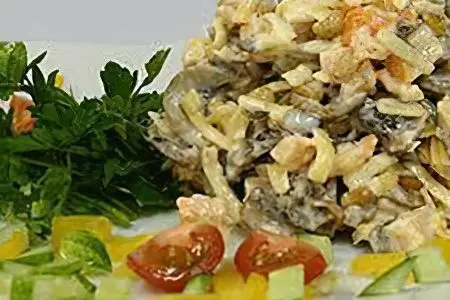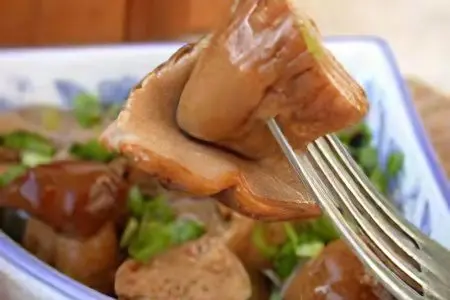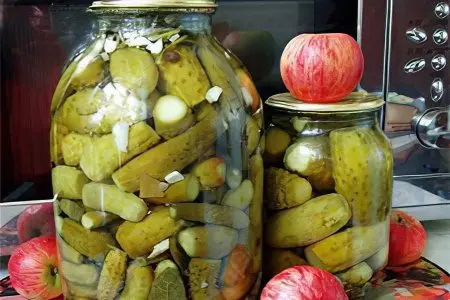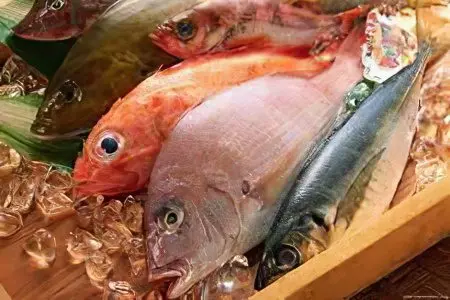Contents

Mushrooms, fish, cucumbers – these foods that are familiar to every person, used in any family, seem completely harmless. However, in a fermented, salty, pickled form, it is they who can become a source of a dangerous disease that can lead to death – botulism. Anyone who is unable to refuse mouth-watering homemade preparations needs to learn the rules for their safe preparation and use.
Botulism in canned food
Fans of home canned food would do well to reconsider their eating habits. Only in industrial conditions can botulism spores be dealt with. This is achieved by autoclaving at 125 °C. Ordinary boiling allows you to fight only the vegetative form of the infection.
Canned fish, vegetables, meat, mushrooms are a potential health hazard:
Botulism spores can originate in canned meat if a long time elapses between slaughter and processing. Poor-quality meat washing and improper smoking also pose a threat.
70% of botulism cases are caused by fungi. This is due to the complexity of the complete cleaning of the product from particles of the earth, long-term storage after collection.
Smoked and dried fish cause whole family outbreaks of infection. The reason can be a variety of factors: violation of storage conditions, preparation of a spoiled, uncooled product.
Beets, carrots, cucumbers and other vegetables, poorly cleaned from the soil, can also become a source of infection.
Botulism in mushrooms

Rarely there are people who have a negative attitude towards such a versatile and tasty product as mushrooms. They serve as the basis for salads and soups, fried with potatoes, dried, marinated, salted. Unfortunately, not only poisonous mushrooms are dangerous to humans. Avid mushroom pickers are at risk, botulism threatens them in the first place.
To reduce the risk will help the observance of simple rules.
When picking mushrooms, you should avoid old and overgrown mushrooms, because this product belongs to the perishable category.
It is forbidden to store mushrooms for a long time, in particular, do not keep them warm.
The soil in which mushrooms grow is one of the main factors for botulism infection. In order not to allow them to become carriers, it is necessary not to pull out the product with mycelium, but to carefully cut it off. The most polluted area will remain in the ground.
Thorough cleaning is another effective preventive measure. Before cooking mushrooms, regardless of the method, you need to scrupulously clean them from blades of grass, adhering leaves, dirt, and rinse them repeatedly.
Botulism in Pickled Mushrooms
Fried and boiled mushrooms are not as dangerous to human health as pickled ones. Many doctors advise people to avoid this source of botulism entirely. Proper harvesting technology helps to reduce the risk.
Regardless of whether mushrooms are pickled, fermented or salted, it is strictly forbidden to roll up jars. The right solution is polyethylene lids that ensure the supply of oxygen to the container. Botulism bacilli spread precisely in hermetically sealed vessels, the absence of air is an ideal environment for them.
There is a misconception that botulism spores are destroyed by sterilizing the jars. However, for the bacilli to die, the temperature must rise above 125 °C. It is difficult to achieve such a result in the absence of a professional autoclave.
Almost everyone remembers that you can’t buy pickled mushrooms from strangers in the markets. But cases when a person fell ill with botulism, having tasted them visiting friends or relatives, are quite frequent. Only self-preparation can reduce the risk.
It is not recommended to self-dry, smoke fish at home, the intestines may contain botulinum spores.
Botulism in cucumbers

Among vegetables, cucumbers have gained notoriety as one of the most common sources of botulism. First of all, this applies to homemade cucumber preparations that can lead a person to a hospital bed.
To prevent this from happening, you must either abandon them, or adhere to the basic rules of preparation:
It is necessary to carefully study cucumbers intended for canning. It is recommended to dispose of products that show signs of rot and deterioration immediately.
Washing cucumbers should be repeated, vegetables are cleaned in running water. Boiling will not help to completely protect yourself from infection, but will reduce the risk. You should boil not only vegetables, but also the dishes used for harvesting.
Hermetically sealed containerscreated at home – the shortest road to botulism. For the preparation of pickles, it is best to give preference to plastic lids.
The right places to store pickles are cellars, refrigerators. Homemade preparations must not be kept warm.
Banks should be carefully inspected before use. The slightest sign of swelling is a reason for rejection.
Open cucumber jars should not be kept in the refrigerator for a long time. If the product is not eaten within a few days, it is best to throw it away. Normal color, smell and taste do not at all prove the safety of pickles.
Botulism in fish

In Russia, botulism has become famous thanks to fish. In pre-revolutionary times, this disease was “blamed” mainly on red salted fish, which was eaten after being “cold” smoked or raw. Salmon, herring, smoked and salted bream, nelma also served as a source of infection.
Modern studies have confirmed that sturgeons are the most dangerous in relation to botulism; representatives of this species are distinguished by their lack of sensitivity to the toxin. Partial fish can also become a carrier – gobies, bream, herring, omul. Fish continues to be dangerous these days, but the risks associated with including fish on the menu can be reduced.
Studies of cases of botulism, the source of which was fish, made it possible to establish that the greatest danger is posed by products that have been stored for a long time without refrigeration before salting.
High-quality cooling is necessary if the fish, after smoking and canning with salt, is put on the table without preliminary heat treatment.
The “symptoms” of putrefactive decomposition of fish, even subtle ones, are considered by doctors as a reason for throwing it away. Smoking and salting a stale product will not eliminate the possibility of the presence of botulinum toxin.
When salting fish, the salt content in the solution must be at least 16%. The product should remain in this solution for at least a week. The recommended cooling temperature is up to 7 °C.
Dried, salted, smoked fish should not be purchased from unknown persons, in unofficial places. Even if food created in artisanal conditions looks attractive, there is no guarantee that it is not contaminated.
The sad statistics says that the disease of botulism in almost 60% of cases leads to the death of the victim. Therefore, despite the rarity of infection, it is worth reconsidering your attitude to your favorite homemade preparations.









